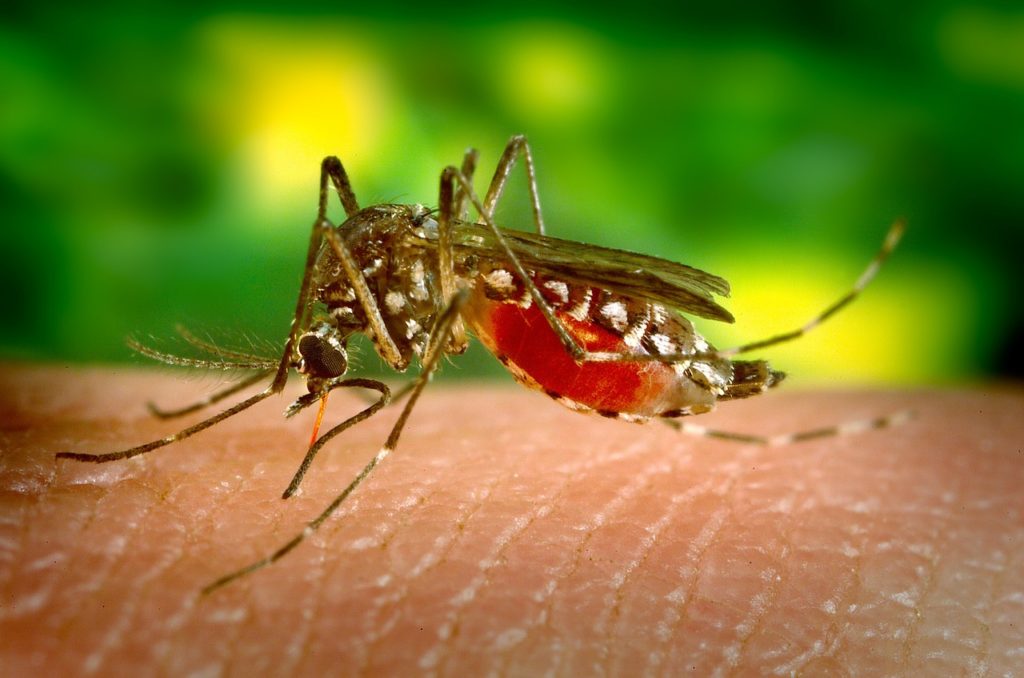
The Health Department today announced that West Nile virus has been detected in two people and a record number of WNV-infected mosquitoes have been detected in New York City across all five boroughs.
Mosquitoes infected with West Nile virus (WNV) are typically present in NYC from July through October, with peak activity during August and September.
Infected mosquitoes can spread WNV to people through a bite. Two human cases have been reported, one each in Brooklyn and Queens.
In the United States, a total of 54 cases with four deaths have been reported this year.
“We are in the height of West Nile virus season, but there are things you can do to decrease your risk of being bitten,” said Health Commissioner Dr. Ashwin Vasan. “Use an EPA registered insect repellent, and wear long sleeves and pants, especially when outside at dusk and dawn when the types of mosquitoes that transmit WNV are most active. In addition, you can stop mosquitoes from laying eggs in the water by emptying outdoor containers that hold water or calling 311 if you see standing water that you cannot empty. Help keep you and your loved ones safe with these actions during WNV season.”
In the City, mosquito and WNV activity is rising, with a total of 1,068 positive mosquito pools across the five boroughs—the highest number ever recorded—compared to 779 positive pools detected at this time last year. An average of 77 mosquitoes were caught in each trap per day, compared to 75 mosquitos per trap per day for the same period in 2021. Once trapped, a large number of mosquitoes are then tested in a single pooled sample or “pool.”
Most people infected with WNV have no symptoms at all or develop fever and other symptoms including headache, fever, muscle aches, and extreme fatigue.
While the majority of patients infected with WNV will go on to fully recover from their illness, some continue to have problems months after infection.
In addition, some people (about 1 in 150), especially those 60 years and older or with a weakened immune system, can develop a serious and potentially fatal illness of the brain and spinal cord called West Nile neuroinvasive disease (WNND) leading to changes in mental status and muscle weakness requiring hospitalization.
If a person has symptoms of WNV, they should contact their health care provider.
West Nile virus was first detected in New York City 21 years ago. Over the past decade, an average of 16 people (ages ranging from 6 to 30 years) have been diagnosed with WNND per year in NYC; their median age was 62 years and the case fatality rate was 14% (23 deaths).
New York City has more than 40 species of mosquitoes, but West Nile virus is transmitted primarily by several Culex species, including Culex salinarius and Culex pipiens.
Most New Yorkers diagnosed with WNV report that they did not use repellent or take other precautions to prevent mosquito bites.
Remember to obtain repellent for yourself and also offer to get it for your older neighbors and relatives. For information about which repellents work best, visit the EPA website to search by product and duration of effectiveness.
The Health Department has successfully helped control mosquito-borne diseases since the West Nile virus was first detected.
The agency’s comprehensive, data-driven approach to mosquito control efforts relies on mosquito trapping and testing results to determine areas of the city to spray pesticide and apply larvicide by helicopter, truck or backpacks.
Throughout the early spring and summer, the Department conducts regular mosquito surveillance with 50 permanent surveillance traps in the five boroughs and installs additional traps around affected areas to enhance surveillance (106 traps currently).
The City controls the mosquito population by applying larvicide in catch basins, marshland and other areas with standing water.
The Health Department has already begun catch basin larviciding, with two helicopter-based larviciding events each in the marsh areas of Staten Island, Brooklyn, Queens, and the Bronx.
In addition, the Department sprays pesticides to target adult mosquitoes where persistent West Nile virus activity is detected, with six adulticiding events in Brooklyn, Queens, and Staten Island this season.
To further reduce mosquito populations, the Health Department also removes standing water and applies larvicide to sites that cannot be emptied or drained; investigates standing water complaints filed through 311; and educates the public about mosquito-borne illnesses through outreach, conducting 80 to 90 presentations annually to educate communities about mosquito-borne illnesses.
Reducing Exposure to Mosquitoes
- Use an approved insect repellent containing picaridin, DEET, oil of lemon eucalyptus (not for children under three), or products that contain the active ingredient IR3535. Visit the EPA site to search by product and duration of effectiveness.
- Make sure windows have screens. Repair or replace screens that have tears or holes.
- Eliminate any standing water from your property and dispose of containers that can collect water. Standing water is a violation of the New York City Health Code.
- Make sure roof gutters are clean and drained properly.
- Clean and chlorinate swimming pools, outdoor saunas and hot tubs. Keep them empty or covered if not in use. Drain water that collects in pool covers.
For more information about the West Nile virus or to report standing water, visit nyc.gov/health/wnv or call 311.
Become a Harlem Insider!
By submitting this form, you are consenting to receive marketing emails from: Harlem World Magazine, 2521 1/2 west 42nd street, Los Angeles, CA, 90008, https://www.harlemworldmagazine.com. You can revoke your consent to receive emails at any time by using the SafeUnsubscribe® link, found at the bottom of every email. Emails are serviced by Constant Contact








